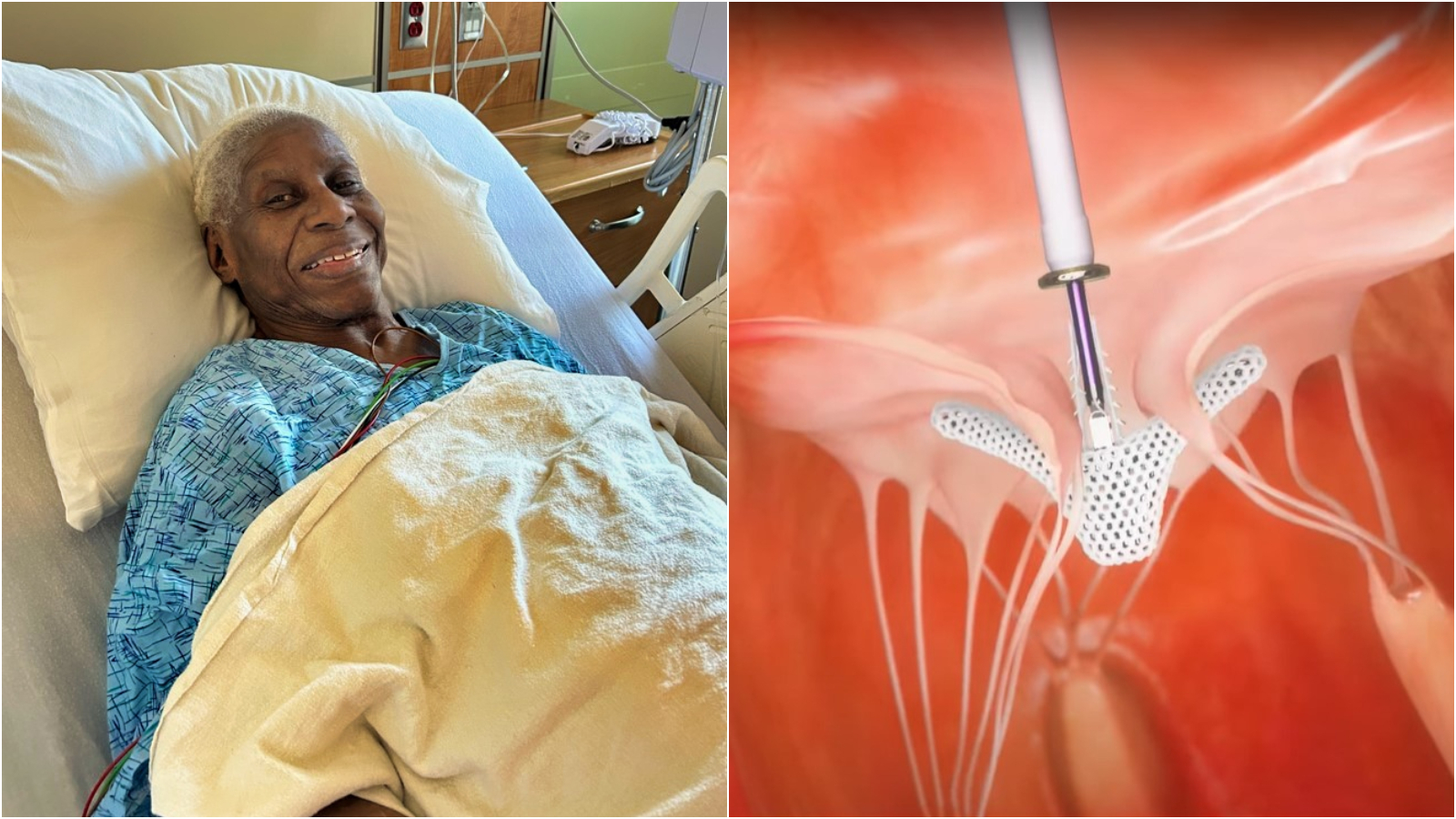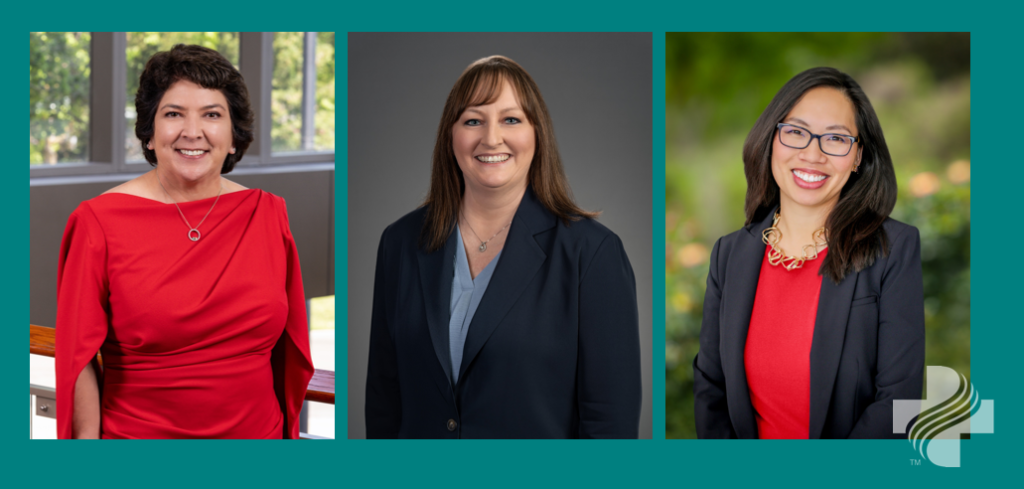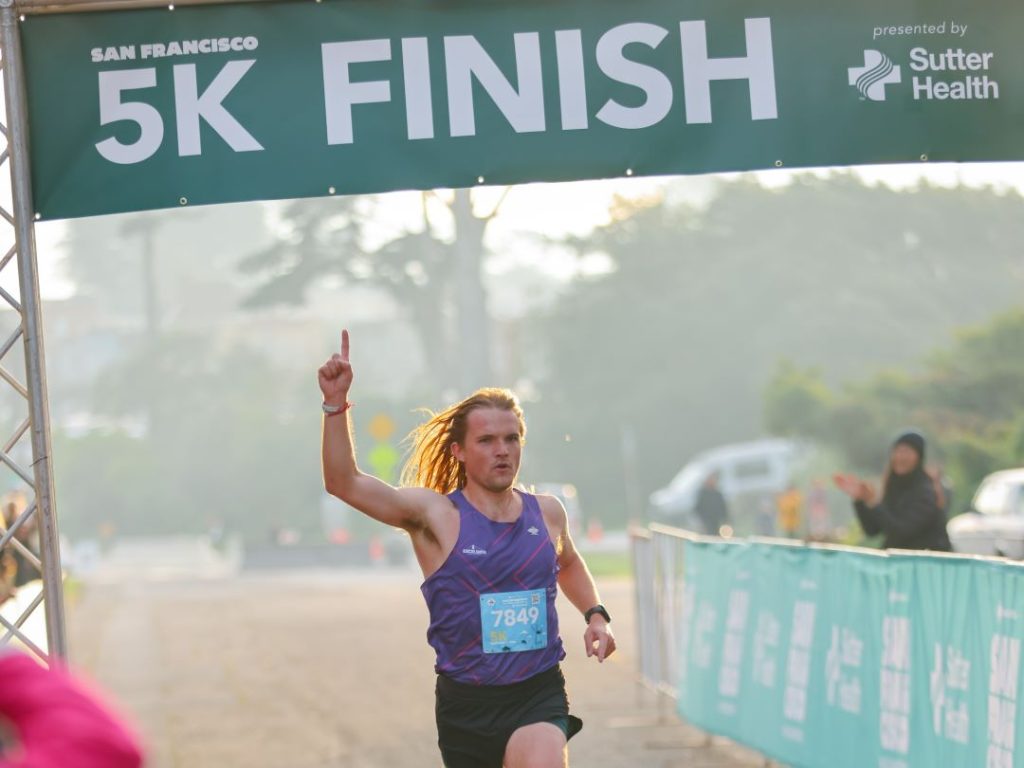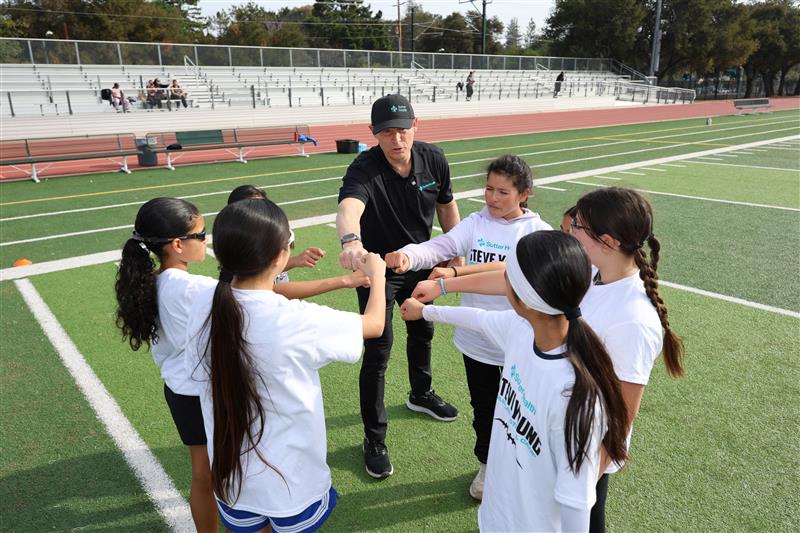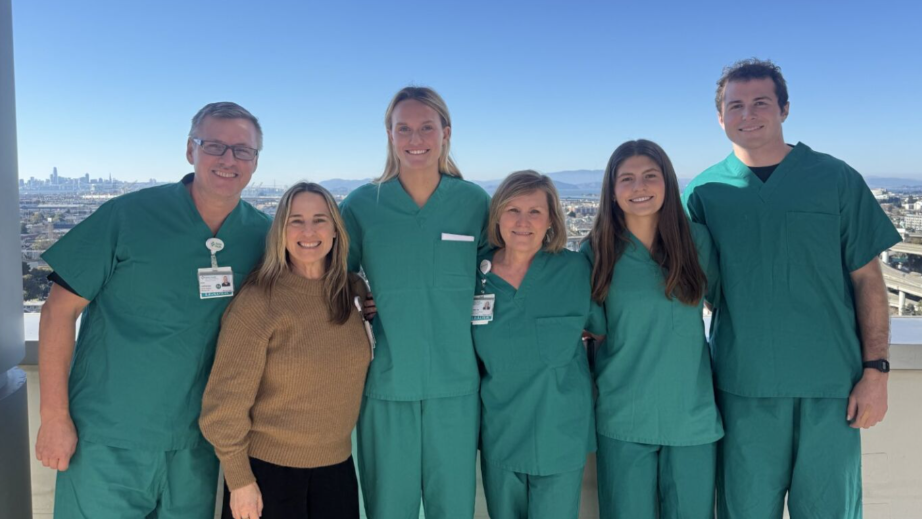Alylean Smith of Oakland is all smiles resting in her hospital bed after having her tricuspid heart valve repaired by the new TriClip™ Transcatheter Edge-to-Edge Repair system, shown at right.
By Catlin Valles, Vitals contributor
Alylean Smith of Oakland will turn 90 in October, but she doesn’t have many plans for a big celebration.
“When you get to be my age,” she says, “there’s nothing left to do but pray.” And, it might be added, take good care of your health.
That’s exactly what Smith did a few months shy of her 90th birthday. On June 20, she had her leaking tricuspid valve repaired with the TriClip™ Transcatheter Edge-to-Edge Repair, known as T-TEER, at Sutter’s Alta Bates Summit Medical Center. It was the Bay Area’s first commercial use of T-TEER, a low-risk, minimally invasive, non-surgical procedure.
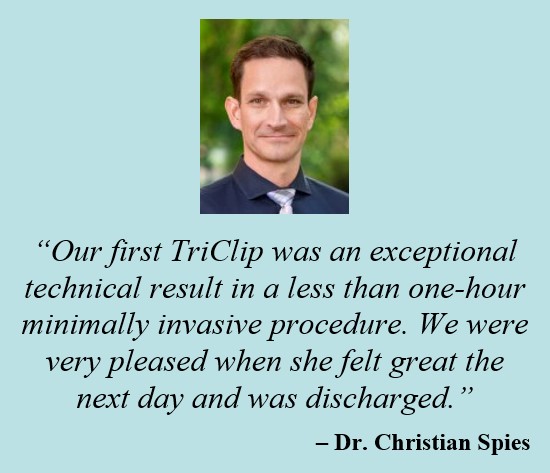 T-TEER was recently approved by the FDA to treat tricuspid regurgitation, which occurs when the heart’s tricuspid valve does not close properly, causing a backward flow of blood from the right ventricle to the right atrium. Left untreated, tricuspid regurgitation can lead to heart failure, liver and kidney problems and, ultimately, death.
T-TEER was recently approved by the FDA to treat tricuspid regurgitation, which occurs when the heart’s tricuspid valve does not close properly, causing a backward flow of blood from the right ventricle to the right atrium. Left untreated, tricuspid regurgitation can lead to heart failure, liver and kidney problems and, ultimately, death.
“Our first TriClip was an exceptional technical result in a less than one-hour minimally invasive procedure,” said Dr. Christian Spies, who performed the procedure with fellow structural heart cardiologist Dr. Mitul Kadakia. “We were very pleased when she felt great the next day and was discharged.”
Smith was impressed by her entire care team, saying she “wasn’t worried about anything” ahead of surgery.
“I was pleased and calm. They made sure I was OK,” she said. “Everyone was amazed that I would be 90 in October.”
Before her diagnosis, Smith said she was tired and felt out of breath. Having a history of asthma, she thought it was related. Dr. Duane Stephens, her long-standing cardiologist, diagnosed her with severe tricuspid regurgitation, which he suspected was causing her progressive heart failure symptoms. To confirm, he arranged for a trans-esophageal echocardiogram with Dr. Luisa Munoz before a referral for a valve clinic with Dr. Spies.
Dr. Spies explained that Smith, like most patients with right heart failure from tricuspid regurgitation, was experiencing fluid overload – which occurs when fluid builds up in the right atrium and right ventricle of the heart. To prepare for tricuspid repair procedure, Dr. Munoz admitted Smith to the hospital by for aggressive treatment to reduce the excess fluid before she was readmitted for the TriClip procedure.
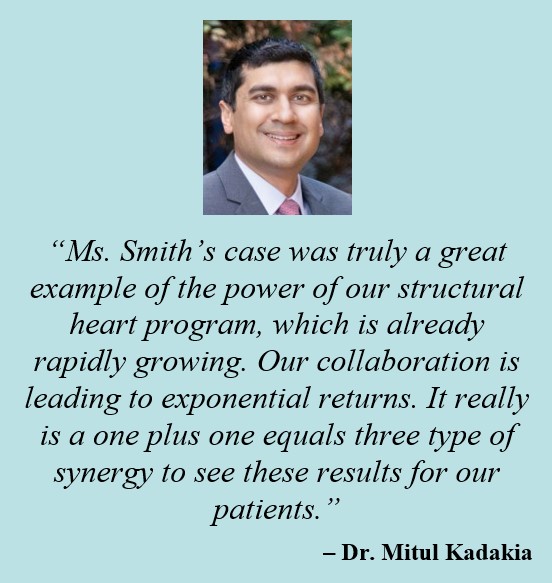 The toughest part, according to Smith, was spending five days in the hospital before her procedure being treated with diuretics to decrease the pressure on her heart caused by the excess fluid. The procedure itself, though, was a breeze.
The toughest part, according to Smith, was spending five days in the hospital before her procedure being treated with diuretics to decrease the pressure on her heart caused by the excess fluid. The procedure itself, though, was a breeze.
“Ms. Smith’s case was truly a great example of the power of our structural heart program, which is already rapidly growing,” Dr. Kadakia said. “Our collaboration is leading to exponential returns – it really is a one plus one equals three type of synergy to see these results for our patients.”
Every member of her care team impressed her. In fact, she’s working on her thank-you cards, saying she’s grateful for everyone from Chadd Cline, a certified nursing assistant on eighth floor who “was taking care of me like I was his grandmother” during her pre-procedure stay, to Dr. Michael Tsang, whom she remembers holding her hand and shoulder as she was going under anesthesia, telling her, “I’m here to save your life.”
“Everyone was just amazed how well it went, due to my age,” Smith said. “I was blessed. And there was no pain — wow. That is really something to think about.”
Due to pre-existing conditions, the team could not do a CT scan to evaluate Smith for transcatheter tricuspid valve replacement instead of a repair. The replacement is another recently FDA-approved, minimally invasive procedure to treat tricuspid regurgitation.
Fortunately, she was a prime candidate for transcatheter tricuspid valve repair with TriClip, which is how she became the Bay Area’s first patient to undergo commercial implant outside of clinical trials.
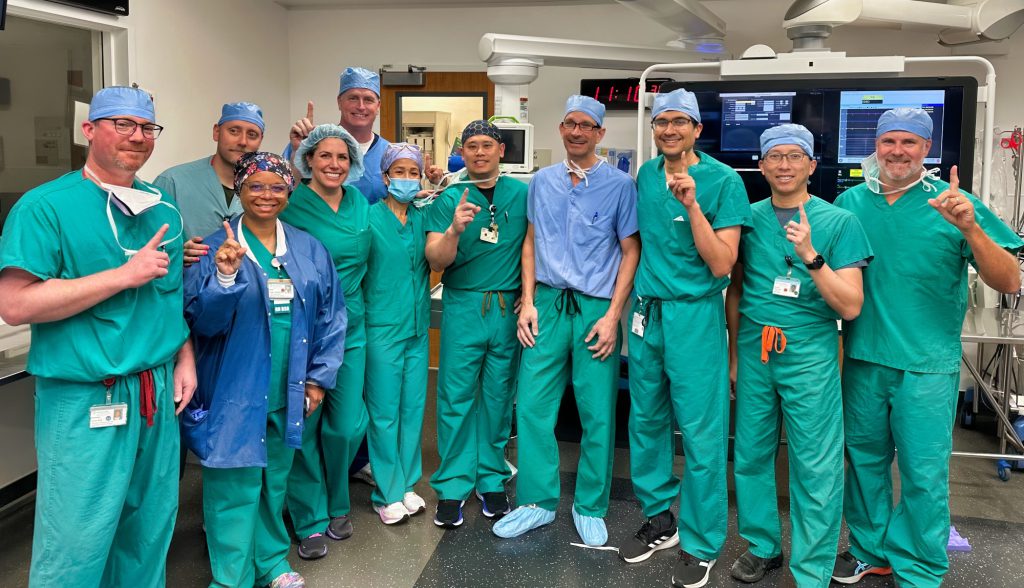
The surgery team celebrates the Bay Area’s first T-TEER procedure outside clinical trials. Patient Alylean Smith praised the care and surgery teams, saying: “Everyone was just amazed how well it went, due to my age. I was blessed. And there was no pain — wow. That is really something to think about.”
She was admitted the morning of her procedure for general anesthesia with Dr. Shurter before Dr. Tsang performed trans-esophageal echocardiography, supplemented by 4D intracardiac echocardiography evaluation – a first at Sutter’s Alta Bates Summit – which utilizes 3D reconstructed images to create real-time videos of the heart via a catheter inserted into the heart.
During her procedure, two TriClip devices were implanted, which instantaneously reduced Smith’s tricuspid regurgitation from “severe” to “mild.” She was discharged the next day, pain-free and feeling “wonderful,” she said.
With her valve repaired, Smith’s 90th birthday probably won’t be her last. Apart from the phenomenal care she’s received, Smith has good genes to thank for her longevity. Her own mother lived to be 95 with no need for glasses or a hearing aid. What’s more, quite a few relatives on her mother’s side of the family lived to celebrate a 100th birthday.
Having spent her working years caring for others – first in senior care and then hospice care, before retiring to take care of her own mother for four years – now Smith is recovering at home under the care of her own two daughters, and she tells everyone, “I’m blessed.”
Her daughter, Rita Smith, who’s been in town from the Central Valley to take care of her mother, was happy to report that her mother is getting stronger every day, and her breathing is back to normal, which is a sigh of relief for everyone.
“I have some good doctors,” Smith concluded. “I say it was prayers first, then the doctors. I knew I was in good hands.”
See how the Tricuspid TEER is implanted in this video.

